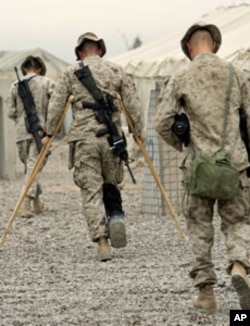Of all the campaign promises U.S. President Barack Obama made, his pledge to pull troops out of Iraq is among the most memorable. Last Friday, Obama made good on that pledge, but not necessarily by choice.
For months, Shi’a Muslim leader Muqtada al-Sadr had been warning U.S. troops to get out of Iraq or face “resistance.”
Al-Sadr’s anti-Western movement enjoys a strong following, and many believe that pressure from Sadrists is what drove Iraqi Prime Minister Nouri al-Maliki to disallow any further U.S. military presence in Iraq. By New Year’s Day, 2012, an approximate 41,000 U.S. troops currently in Iraq will have returned home. They, along with observers across the globe, will likely be scratching their heads for years, asking whether the invasion of Iraq and ensuing conflict were worth their $800 billion price tag, the loss of more than 4,400 U.S. troops and the deaths of as many as 112,000 Iraqis.
In a September 20 article in Foreign Policy, Peter Van Buren, State Department Foreign Service Officer and author of We Meant Well: How I Helped Lose the Battle for the Hearts and Minds of the Iraqi People, argued that things do not look well for Iraq, at least in the short term. There has been, in his words, “no resolution to the Arab-Kurd issue, no resolution to the Sunni-Shia issue, no significant growth in the oil industry, a weakened U.S. presence more interested in a Middle East land base and profitable arm sales than internal affairs, and an increasingly influential Iran seeking a proxy battleground against the United States and a nicely weak buffer state on its formerly troublesome western border.”
Michael Rubin, a resident scholar at the American Enterprise Institute (AEI) and senior lecturer at the Naval Postgraduate School takes issue with such grim assessments. “The Iraqis, for the first time, really had a shot at freedom,” Rubin said, “and while Iraq today isn’t perfect, for the vast majority of Iraqis, life is much better than what it was under Saddam.”
Rubin points to the same issues - Kurds, religious sectarianism, Iran’s looming influence - were not resolved during Saddam Hussein’s regime. “The issue that many people forget is that Saddam Hussein didn’t bring stability. Indeed the Kurdish Civil War started in 1961, and what we learned after Saddam’s fall was that the Republican Guard may have controlled the streets in southern Iraq during the day, they didn’t control things at night.”
In short, Rubin says, the status quo in Iraq was falling apart. “Too many people in hindsight will look at the issue as a choice to either go to war and unseat Saddam, or simply to have stability and sanctions. The sanctions were falling apart, and what all of Saddam Hussein’s doctrines show, he had every intention of reconstituting the worst aspects of his force and his capabilities, as soon as the sanctions collapsed.”
The scholar says President Bush had two choices: “Either to unseat Saddam or see him re-empowered to the fullest. I do think that most people in the region are glad he made the former choice, even if they disagree with how the war was conducted.”
As for the troop pullout, Rubin is among those who have felt strongly that the U.S. should retain a military presence in Iraq. He says he would have preferred a lasting military presence in Iraq, “as long it takes to fill the vacuum, as long as it takes to bring stability.”
Karen Kwiatkowski, Ph.D, is a retired United States Air Force lieutenant colonel, who for four years prior to her retirement in 2003 worked in the Pentagon’s Near East South Asia Policy Office (NESA). While there, she wrote a series of articles accusing neoconservatives and other interest groups of kidnapping U.S. Middle East policy. She retired from the Air Force a year later; today she teaches, writes about defense issues and is running for Congress. She is as outspoken now as she was a decade ago.
“It’s pretty sad, really,” she said, “that almost ten years have gone by since stories were told to justify the invasion of Iraq, a country which was very weak militarily, very weak economically, that had been suffering under sanctions that we enforced for many years, over a dozen years, and had no air force, had no navy, had nothing to do with 9/11, had nothing to do with associations with al Qaeda… and yet we were able to basically drum up a war and invade, topple their government, destroy not just their political system, but their society - you know; we went for the infrastructure, the water and electrical grid. And yet, to this day, we have not yet repaired that. And now, we’re drawing to a close and leaving behind what? Not a victory, but probably multiple generations of hatred for Americans - and oh, are we pumping oil there yet? No, we’re not.”
What about the man who many credit with being among the architects of the Iraq War? Dr. Harlan Ullman, co-author (along with James P. Wade) of the “Shock and Awe” doctrine, which was implemented in the 2003 Iraq invasion. Today he is a Senior Advisor at the Atlantic Council and also a Distinguished Senior Fellow at the National Defense University. “Iraq was probably one of the worst foreign policy blunders in our history,” Ullman said, “and in terms of the damage that it has done and will do to the country, far exceeds the Vietnam War.”
He still supports the doctrine of “Shock and Awe,” which he says has gotten a “bad rap.”
“’Shock and Awe’ was used to characterize the strategy we used in Iraq in 2003,” he said. “But that was not ‘Shock and Awe.’ That was Desert Storm on steroids.”
The problem, Ullman says, lies in what he calls America’s “national DNA”, an ideological view of the world is framed by what Americans think the world should be, not the way it really is.
Ullman says the point of “Shock and Awe” was simple:
“You decide what is the outcome you want to achieve, then you work back to get it. The outcome we wanted to achieve was to destroy the Iraqi army and destroy Saddam Hussein. That’s fine. But that’s not a tactic, that’s a strategy. And what we would have done if we were going to employ ‘Shock and Awe’ correctly was to say, ‘OK, what do we want to see? We want to see a stable Iraq, under the rule of law, with a new form of government.’ If we had established that from the very beginning, we wouldn’t have had to defeat the Iraqi army. We could have simply made the attack. I think the army would have deposed Saddam Hussein; we could have forced them to surrender more quickly.”
Perhaps the greatest American experts on the success or failure in Iraq are those who are not as easily heard from: the tens of thousands who already served in Iraq and the more than 40 thousand war-weary troops who will shortly begin straggling home to adjust to lives as civilians in an uncertain economic and political climate. After the saga of the Iraq War appears more fully in the rearview mirror, these men and women – who have sacrificed so much personally for the conflict – may speak out about lessons learned, and whether or not wars like the one that took place in Iraq was indeed worth it.



















